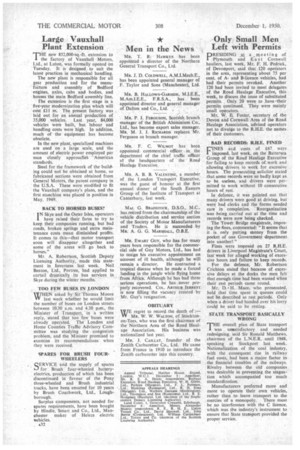• 'Only. Small Men Left with Permits
Page 34

If you've noticed an error in this article please click here to report it so we can fix it.
PRESIDING Jit a meet i ng of Plymouth and E-a at Cornwall hauliers, last week, Mr. F. H. Pedrick, of Devonport, said that 120 operators in the area, representing about 75 per cent. of Aand B-licence vehicles, had had their permits revoked. Another 120 had been invited to meet delegates of the Road Haulage Executive, this week, to discuss the issue of substituted permits. Only 20 were to have 'their permits continued. They were mainly small operators.
Mr. W. E. Foster, secretary of the Devon and Cornwall Area of the Road Haulage Association, advised operators not to divulge to the R.H.E. the names of their customers.
BAD RECORDS: RILE. FINED
L"INES and costs of • £67 were 1 imposed, last week, on the Battersea Group of the Road Haulage Executive for failing to keep records of work and allowing drivers to work for excessive hours. The prosecuting solicitor stated that some records were so badly kept as to be useless, and drivers were permitted to work without 10 consecutive hours of rest.
In defence, it was pointed out that many drivers were good at driving, but were bad clerks and the forms needed care in completion. Reorganization was being carried out at the time and records were now being checked.
The Tower Bridge magistrate, imposing the fines, commented: it seems that it is only putting money from the pocket of one Government department into another I " Fines were imposed on 27 R.H.E. drivers in Liverpool Magistrate's Court, last week for alleged working of excessive hours and failure to keep records.
For the defence, Mr. Robertson Crichton stated that because of excessive delays at the docks the men felt that enough time had been wasted when their rest periods came round.
Mr. D.• H. Mace, who prosecuted, held that time spent in queues could not be described as rest periods. Only when a driver had handed over his lorry could be said to be resting.
STATE TRANSPORT BASICALLY WRONG
THE overall plan of State transport was unsatisfactory and needed redesigning, said Sir Ronald Matthews, chairman of the L.N.E.R. until 1948, speaking at Stockport last week. Nationalization of the coal industry, with the consequent rise in railway fuel costs, had been a major factor in . the financial troubles of the railways.
• Rivalry between the old companies was desirable in preventing the stagnation which accompanied too much standardization.
Manufacturers preferred more and more to operate their own vehicles, rather than to leave transport to the mercies of a monopoly. There must be no interference with the C licence, which was the industry's instrument to ensure that State transport provided the proper service,












































































































